Anatomy of an Era: Toby Wright, Part 1
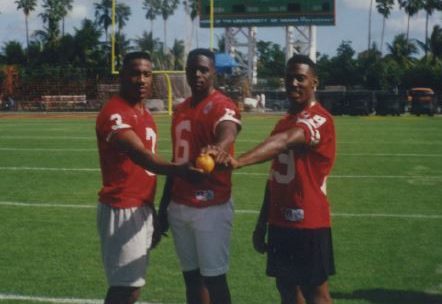
Excerpted from Chapter 91, No Place Like Nebraska: Anatomy of an Era, Vol. 2 by Paul Koch
Life is a grindstone. Whether it grinds you down or polishes you up depends upon what you are made of.
You’ve heard his name mentioned a few times previous, and with relentless diligence I finally tracked down a Blackshirt of Blackshirts: Toby Wright, Arizonan by birth but Nebraskan at heart.
For an apt word-picture of the man, think of a ballistic missile launch gone suddenly awry: standing at the launch site your eyes tensely, hesitantly, nervously follow the streaking, speeding missile blazing wildly across the sky as it travels with a directionless fury, smoke trailing and telling of its unrestrained violence, its fierce and intimidating power. You’re apprehensive and acutely on guard in case it somehow turns your way. Question is, what would you do if the thing actually took aim at you? You’d more than likely freeze in your tracks, knowing any move on your part would be futile anyway: your own, limited physical abilities unable to escape the destruction of its awesome and fatal impact.
Such was the play of Toby Wright. Full of sound and fury, he left an impression not only on opposing receivers and running backs, but upon his own team mates years into the future. His was an investment of total self: depositing every drop of blood, sweat and tears at the proverbial teller’s window. Let’s reacquaint ourselves with Toby Wright, the rocketman with a heart on his jersey’s sleeve who set future Blackshirt backfields on a course for the stars…
Notable quote #1:
“At Nebraska I learned to fight for something and to live for something. I learned to be a part of an elite people who actually had earned the right to be who they are: The Blackshirts.”
Toby Wright
Scholarship recruit, Rover, Phoenix, Arizona, (Dobson) (Phoenix College)
Where are they now? Phoenix, Arizona, Gym Owner
Question: Toby Wright!
Toby Wright: How you doing, Paul?
Q: Been busy. I suppose you’ve been very busy, too?
TW: I’ve been trying, man. I’ve been trying, Paul. Life after football is tough.
Q: I sense a tinge of pain when you say that…
TW: Oh, my goodness. I tell you what, it’s got a whole new meaning to it, but it’s a tough thing to no longer play.
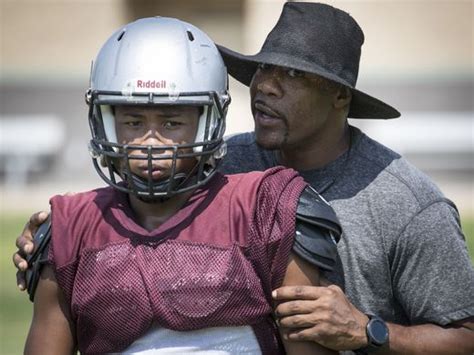
Q: So what’s the name of your ‘training academy’? Is that what you call it?
TW: It’s actually called SPOT Fitness. I have an academy part of it. What we do is, we take young kids and we try to place them, get them to the next level from high school to college and from college to the pros. I’m doing okay, but I think I just came to the conclusion that I don’t want to work with pros anymore.
Q: Really? Why not?
TW: Because they’re too arrogant, Paul. You talk to them, dadgummit, and they think they all know everything. (laughs)
Q: Then their career hits a down cycle as they age, where they become desperate and finally willing to listen to you?
TW: Right. Then they come back. And then they come to you and they want you to do a miracle for them. And come that time they don’t have just one foot out the door, they have almost their whole body out the door! (laughs) That’s when they come back.
Q: I suppose on those occasions you tell them, “Hey buddy, if you would’ve worked with me the last few years you wouldn’t have to ask for a miracle,” right?
TW: Exactly, Paul. Exactly.
Q: So how did you get into that line of work? Were you an exercise science major?
TW: I was actually a Human Development minor and Child Psychology major. On the other side, I’d been training for the longest time. And I came back home and I started a foundation, of course. I’ve had that for 15 years. I’d been working with all the young knuckleheads forever, then all of a sudden I started working in the offseason with a group of aspiring guys that I’d train. So I started that.
Q: What inspired you to do such a thing?
TW: One day I was sitting on the couch and going through my post-football syndrome -and I was determined to never be a lush- and I was like, ‘Let me get off this couch.’ I opened up a facility, so I started to train kids again and started getting back to my passion, and it just started making its way.
Q: Well, let me tell you, Toby, some of the Nebraska defensive backs who were younger than you –and they’ve mentioned you specifically- they tell me that they didn’t know what it was like to truly hit somebody until you came along and showed them. They speak of the effort and intensity that was needed to get to the next level and that you -Toby Wright- brought it! They say that you inspired them through both attitude and example and made them better players. Have you heard that before?
TW: No, I’ve never heard that before. Never before.
Q: Oh Toby, they go on and on about your propensity to just “bring the wood.” Your example was parlayed into national championships after you’d left for the pros. I sense that you are one of the main pieces of the puzzle that I’ve been faced with solving here, so I’m glad to have finally tracked you down for your input.
TW: (laughs) Well, thank you. Thank you. You have no idea how much this is doing for me. I know I can speak for other guys -because you play in the pros and that’s a great thing- but I talked to (Kevin) Ramaekers about two or three months ago when I was at the third game of the season in Lincoln, and I went to hunt down Mike Anderson and some of the Blackshirts, and you have no idea how great it was to see them again. People just don’t know what that feeling is, you know?
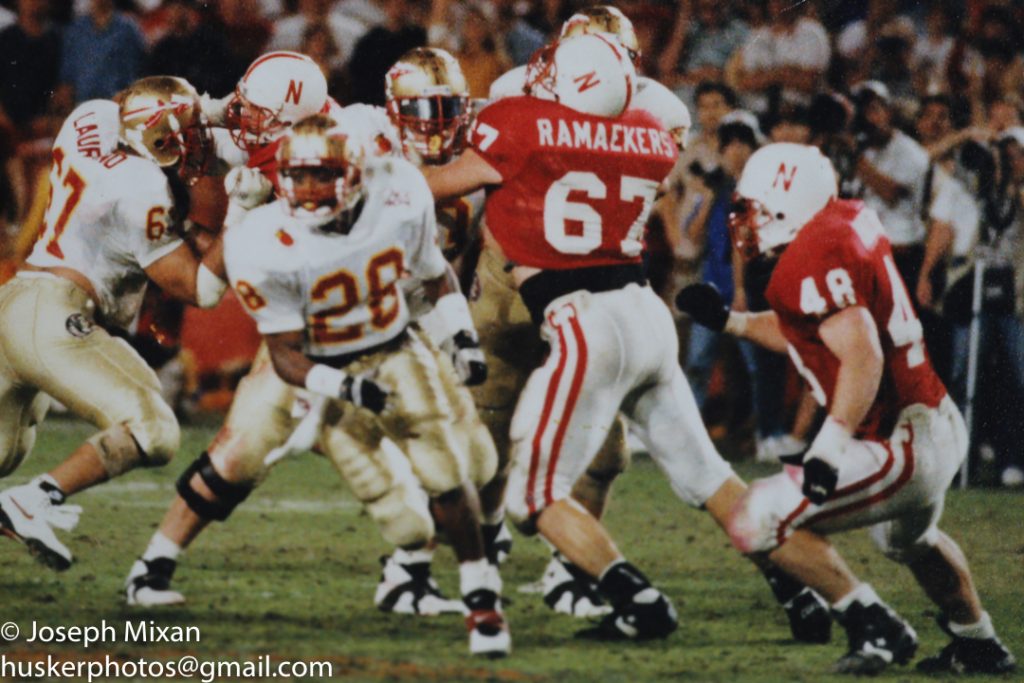
Joe Mixan photo
Q: What kind of feeling?
TW: I played seven years in the pros and they were good, but there’s nothing like feeling the old passion when everything was honest, when you played the game for the love, just to be in an environment at Nebraska where ‘this was all I played for.’ The family that I had at home was one thing, but to be a part of the family-within-a-family at Nebraska? To be a part of the same creed? Those things are priceless.
You know, I’m married now and have kids, but those are things that you just cannot replace. And my oath right now is to my family, and I try to build a creed and say, ‘Okay, our lives are like this, and we stand for this…’ And it’s hard, because there’s nothing like being able to do what the Blackshirts did -what I’d been taught there – the meaning behind what it is you stand for: being a part of an elite group that’s way bigger than you. And you know what’s really a trip? I didn’t realize how powerful it was until after I’d left.
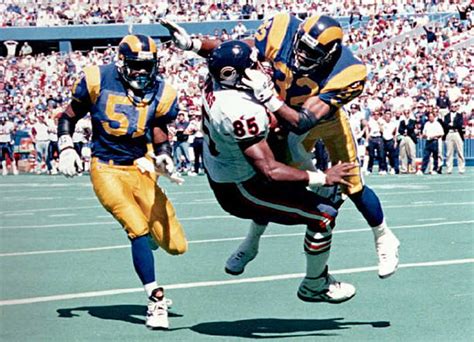
Q: Others have said the same, Toby. So, you’re married. How’d you meet your wife?
TW: Yeah, I’m married. Me and Jandi have been together nearly twenty years. I met her in Phoenix when I got out of high school and was coming off an ACL, so I went to a junior college. I was still trying to find myself, of course. I’ve got a ten year old and a seven year old. I have a son, Brandon, who I had in high school. He’s twenty-two right now.
That was something else, that whole thing: being a kid and having a kid. I lived through that whole segment. I was just looking for direction. I’m just really blessed to have been a part of good things with good people.
Q: What about your family growing up? I hear you had a few special influences of your own?
TW: I’m the youngest of five. I had three brothers who actually played at that college and pro level. I was just a young brother looking for direction and, like I said, the first thing I knew I had a son.
And I made a decision -I had a big speaking engagement at Wells Fargo recently. They brought me in to tell my story- and I was telling them that everybody has a chance to shine and make a decision. And I told them that in my life there was a turning point: I was at that free-throw line with one second left… I was at the fourth & one and making that goal line stand (like I was at that Florida State game and made the hit on William Floyd that didn’t count), I was in certain situations where you’ve actually got to make the play. I came from junior college and had blown out my knee -I was still a knucklehead- but I made a decision I was going to go all the way, go 110%, and I changed my element. I also had a chance to go to USC and Washington, but after going to Lincoln I made the decision.
Q: How did that come about?
TW: I said, ‘This right here is fitting for Toby Wright.’ I could have gone to USC and all these other places, having fun and being in the sun, hitting the beaches and all these places, but I actually made the decision that was the mature decision. And I called my mom and said, ‘You know what, Ma? I had Brandon at fifteen. I put you through so much, Mom. I’m the baby and I put you through so much, and I think this is the place for me, because Coach Osborne is about doing things his way or no way. They have a tradition that is incredible, and it’s built by Nebraska and the surroundings around them there.’ I assumed that role, and for me it was everything. I couldn’t have picked a better place.
Q: So you’re saying that despite the lack of the beaches, the babes in bikinis and all the extracurricular stuff, you picked Nebraska because of the people, per se?
TW: You know what, I was indulging in all that kind of stuff, don’t get me wrong. I was still straight-laced and respectful as a kid, but I was a vessel that was just going everywhere: I was willing to hang out, willing to do this and absorb the college life and all that.
Coach Ron Brown had come down during my recruitment to meet me, and then we’re flying back to Lincoln on this plane. And you know what? Ron Brown pulled out this Bible. I’m sitting right next to him and he asked me, “Do you know anything about this?” And I was, ‘Yes, I do.’ So then we were just talking about whatever. And it wasn’t just a front. And the one thing about Coach Brown, I felt the sincerity in him from a long time ago. And I tell you what, that was going on there.
And just to meet Coach Osborne and the whole ambiance that was there, it was for me. I made the decision of my life right then, because I was into the girls and I was doing this and doing that. I needed a change, and thank God it came. Nebraska came.

Toby Wright (lower right)
Q: It sounds as if yours was a self-imposed discipline, shutting some extracurricular things out of your life so you could focus… focus for the sake of football and personal development? ‘Eliminating the unnecessary’ in your environment?
TW: And you know what, I couldn’t imagine it any other way. I can’t say I was always doing the right thing, but I was always wanting to do the right thing. (laughs)
And it’s pretty weird how Nebraska came into the picture. My defensive coordinator, he was telling me, “You’re playing that type of football: Division I, and it’s anywhere you want to go.” And Coach Sampson comes up and says, “Toby, I’ve got a place I think that you would love to go to. Would you like to go to Nebraska?” And I was like, ‘Yeah, I would love to go to Nebraska!’ I lit up. I was like, ‘Coach Osborne? Oh, my God.’ He said, “I just think that if they see your tape there’s no reason why they wouldn’t want you.”
Q: So you already held Nebraska and Coach Osborne in high regard?
TW: It’s pretty weird, Paul, because a week had passed and here I’m sitting there with Coach Osborne. So I’m sitting in the coach’s office at Phoenix Community College and all of a sudden Coach Osborne is telling me that other coaches had seen my tape, but that he hadn’t. So he asks if it’s okay if he takes a look at my highlight tape while we’re there in the coach’s office. And he puts the tape in and says, “I’d just like to see a couple plays.”
Now, I’d never ever seen Coach Osborne ever raise his voice or get very excited, and I suddenly I hear Coach Osborne and he’s watching the tape and he goes, “Hmmm! Oh, gosh!” And then he goes, “Toby, when will you make your decision?” And I go, ‘Next week I might go to Washington’ or some other place. And he goes, “Do you think you might like to leave on Friday and come out to Nebraska?” And I said, ‘Yes.’ And he said, “Do you know why? That week we’re not bringing any recruits in, so you’ll be the only recruit that we have that week before we start really bringing them in.” So I was the only recruit that week! And when I came down there it was just incredible. Just incredible.
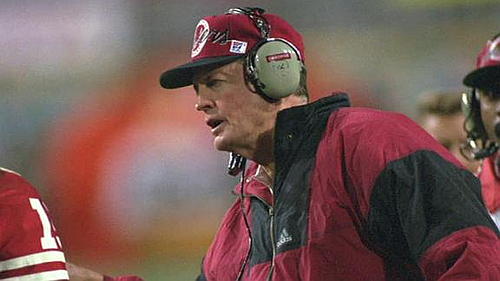
Q: What part of the culture appealed to you most, Toby?
TW: To be a part of something that was bigger than you, and you had the tradition of it all: the fact that it’s a place that just lives and breathes football. It was just incredible. The pros was great -I miss the money- but at Nebraska I learned to fight for something and to live for something. I learned to be a part of an elite people who actually had earned the right to be who they were: The Blackshirts.
And I live that way now. I have cousins and friends from my time there -and I’d like to say I earned the right to say I love them- and they care about me and we trust each other to this day. I learned it at home, too, but it was solidified as I was coming into my manhood at Nebraska.
Q: Do you recall the time of year you flew into Lincoln for your recruiting visit?
TW: Do you know what, it was supposed to be snowing -and I brought a jacket, of course- and all of a sudden they had a record-breaking great day, in the 70’s or something. It had to be in November, maybe, because I actually walked out onto the field and saw the team practicing. It must have been right before the Oklahoma game and I saw Tyrone Byrd, because I remembered playing against him in high school. I saw T-Byrd practicing, he was an Arizona guy. I just remember walking out there onto the field and this place was made just for football only. Memorial Stadium: it was incredible.

Available on Amazon.com
Q: So what year was your first year on campus as a student-athlete?
TW: It was 1992.
Q: You said your older brothers had played at a high level. Where did they play?
TW: Well, my brother Tommy played at Northern Arizona and he had a shot to play with the Houston Oilers. He was there for a couple mini-camps.
My brother Terry played at the junior college and then he went to Temple University. And then he went free agent to the Cleveland Browns and played a year or two for the Colts, then he ended up playing five or six years in Canada.
My brother Torey (T.C. for short) was a running back. He played at San Diego State. He was actually the starter before Marshall Faulk came in. Marshall was playing behind him and my brother was the one that was starting before him and he was All-American. They played Azusa Pacific one weekend and they had like 408 yards in the first half, then he got hit and had a muscle contusion in his thigh, and then he was done for almost four weeks. So then this young kid from Louisiana -Marshall Faulk- came in broke the record with something like 508 yards. T.C. ended up going to the Giants and played there for a year, was in the World League for four years and then jumped around in Canada.
Q: As an aside, I heard that Marshall Faulk actually wanted to attend Nebraska, but we only wanted him to play defensive back. I heard San Diego State was the only school who said he could play running back. Have you heard that before?
TW: Exactly, they wanted him to play corner. That’s exactly it. Exactly.
Q: And let me ask, what kind of things stood out to you in making the jump from junior college to Nebraska?
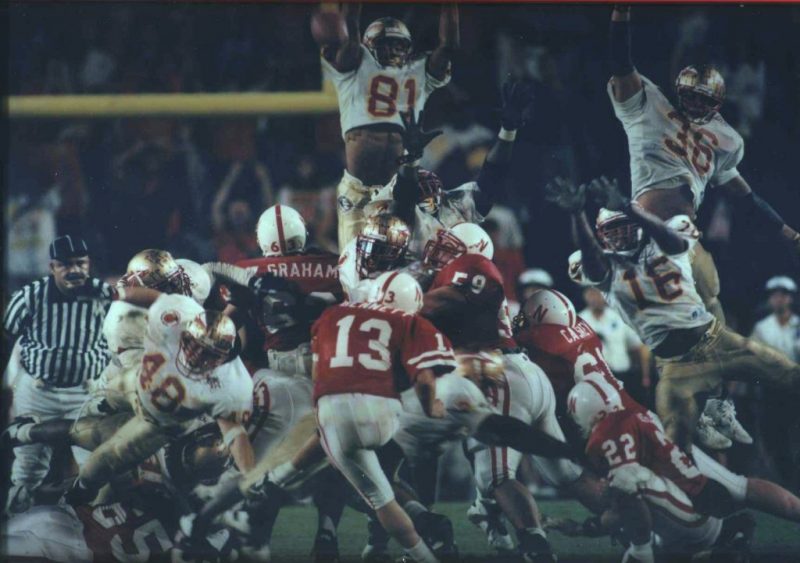
TW: Oh God, the tempo of the game. The game was so fast. Do you know what it was like? It was like being on the freeway and everybody is going 80 miles per hour… and I’m only going 35. And it’s a trip, because everybody is whizzing by and there’s people behind me saying, “Speed up! What the heck?!” I just looked around and said, ‘Oh, my God! This is incredible.’ But when you match that intensity and play at a certain level, the tempo will come. It’s almost like you have to be able to take the brakes off.
And when I first got there I had my ACL and had my brace that I brought along with me. When I first showed up and found the tempo wasn’t going to work for me -I was like Linus of Peanuts with his blanket, you know what I mean?– I looked at my brace and I looked around on the sidelines and no one else had braces on. And they were all moving so fast! So I wiped my tears and threw the brace away and said, ‘Here we go.’
Q: All or nothing? Boom or bust, huh?
TW: Yeah, of course. ‘Here we go!’
Q: So where did you get the propensity to hit people the way you did? Where do you think that came from?
TW: I don’t know. I’d always been a hitter. I didn’t really start nurturing it and being explosive until I finally got to junior college. I think the game of hitting just came with the passion. I got to the point where I was playing the game at such a passionate level. It was almost like a complete emotional rollercoaster for me. When I was at Nebraska -and even at the Rams- they called me the ‘emotional leader.’ It was enough for me to be that at Nebraska.
And I remember Ed Stewart -there were times during the game when they’d be trying to pep each other up, and Ed and Mike Anderson and the guys would say, “Alright, Toby! Let’s go T-Wright!” And then they would look over into my eyes and go, “Damn, what’s the matter?” And I’m bloodshot red and crying. It was like I’m playing for world hunger or somebody! (laughs)
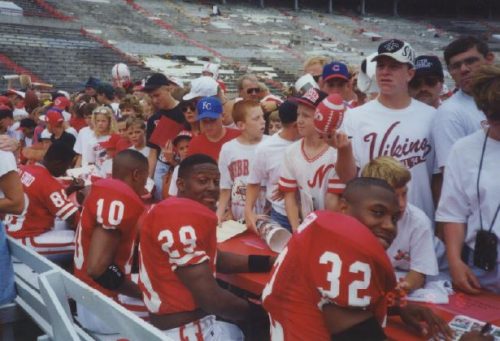
Ed Stewart #32
Q: In what way did you nurture it and become so violently effective?
TW: I experienced a complete epiphany about the game, and I would do meditation. I was kind of weird, you know? (laughs) It wasn’t nothing for Dr. Jack Stark, the team psychologist, he was always around my locker. And everybody was like, “Toby’s crazy.” He’d ask questions like, “It’s really weird, Toby, you don’t have a celebration dance after you make a play. It’s different with you. It’s not like you’re ranting and raving after a play, it’s like you have something different to prove.” And every day I would go over my plays and the whole scenario, and every time I’d make a play it was like I’d already done it before. I never really had a celebration, I just screamed and yelled and everything else, it was just spontaneous. They all thought I was crazy.
Q: Kind of sounds like someone describing Grant Wistrom, how he didn’t have a dance or anything… how he would just do a wiggle and a shake or whatever else came to him at the moment.
TW: And do you know what, there was a blog (speaking of Grant Wistrom), because as I was just leaving the Rams he was coming in, and we were both there a year, I think. But there was this blog and they were talking about comparing and contrasting me with Grant Wistrom, how Grant played at Nebraska and Toby Wright had played there, too. And they talked about how I lost my national championship game and then after I leave he wins it with Nebraska…and then here I go to the Rams and go through the same thing and end up leaving, and then he goes and wins the Super Bowl with them, also. It was kind of sad, the way it was, but it was something else.
Q: So twice in a row you played a part in setting the stage for Grant’s team to finally win it all?
TW: Exactly. And we were Huskers who played the same: we gave all we had. That was the state of circumstances and how the coin rolls, I guess. I don’t know who did the blog, but I was reading it and it really made me teary-eyed, to tell you the truth. They talked about my hit at the goal line (versus Florida State) and if that would have counted such and such would have happened and we would have won the National Championship. But it was something else.
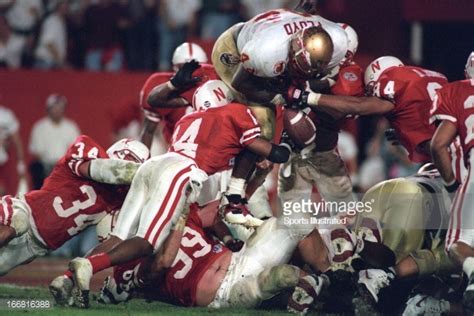
Q: You were the one who hit William Floyd on that goal line ‘touchdown call’, weren’t you? The hit that knocked the ball out before it crossed the goal line, but the officials gave the touchdown to Florida State, anyway?
TW: Oh yeah. Oh yeah…
Q: You know what, I remember your being absolutely incensed, talking to the referee and jumping up and down, shaking your fist and stomping your feet. You were livid!
TW: You know what, if instant replay had gone on at that time? I know we would have won the national championship.
Q: I talked with Corey Dixon some time ago and in his heart he feels you guys won the national championship.
TW: You’re right. Corey’s kickoff return for a touchdown, it was something else. It’s just incredible how things worked.
To be continued tomorrow….
Copyright @ 2013 Thermopylae Press. All Rights Reserved.
Photo Credits : Unknown Original Sources/Updates Welcomed
Author assumes no responsibility for interviewee errors or misstatements of fact.